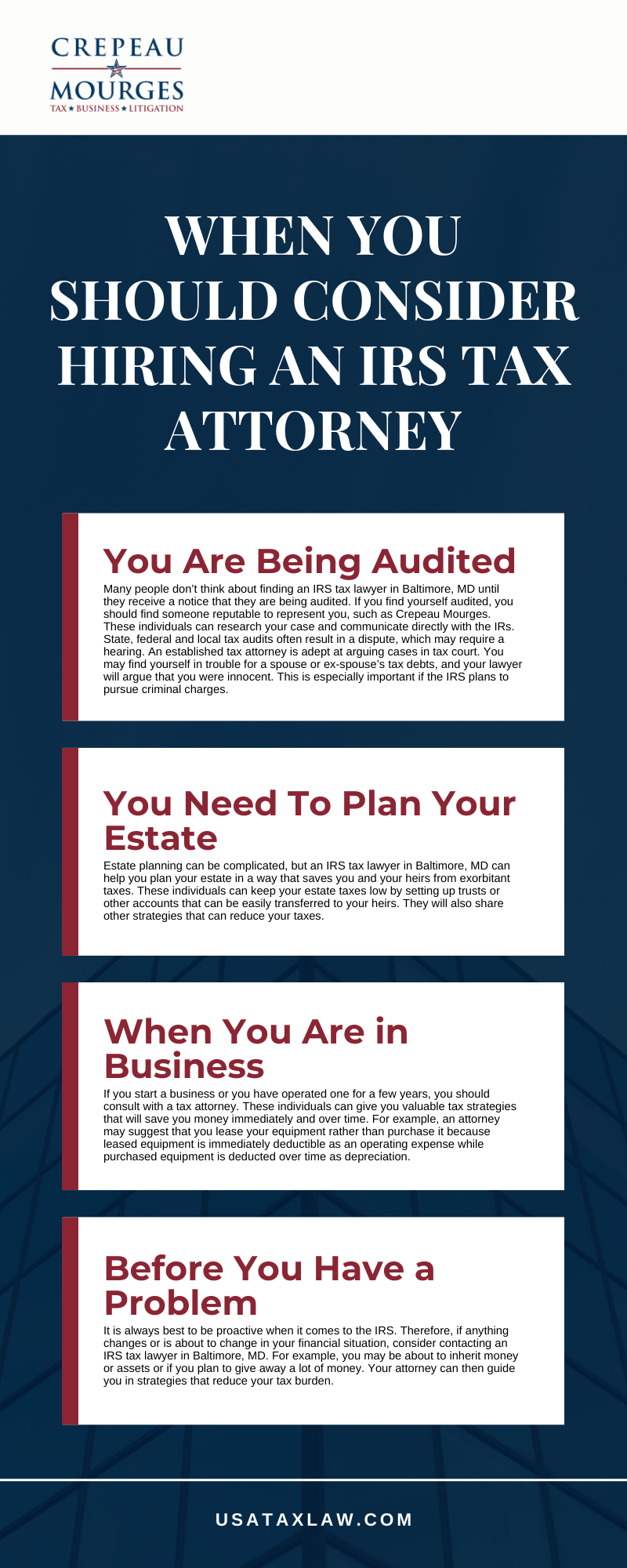
Your Dedicated IRS Tax Attorney
The IRS is the world’s largest and most powerful collection agency. If you have received letters from the IRS for unpaid taxes or unfiled tax returns, do not wait to act. The IRS will begin legal proceedings by mailing aggressive collection letters to your home, followed shortly by a court order and a knock on your door from an IRS agent. Our Baltimore, MD IRS tax lawyer will help you to stay on top of your tax issues.
The IRS will also garnish your wages, levy the funds in your bank account, file a lien to severely damage your credit score, and seize your home. In addition, a new law has passed in Congress that the IRS will revoke passports of Americans and prevent them from leaving the country if they owe IRS taxes.
Arrests are also made daily for ignored and unpaid tax liabilities. If you have received any calls or letters from the IRS, contact Crepeau Mourges today for a free telephone conversation with an experienced IRS tax lawyer Baltimore, MD. Our professional staff of renowned Baltimore IRS tax lawyers have represented thousands of Baltimore residents and know exactly what to do to obtain the best settlement possible for your IRS tax problem.
IRS tax lawyer Baltimore, MD will resolve and settle your tax issues. You will no longer have any sleepless nights or ever have to worry about the IRS issuing any levies, garnishments, liens, or seizure of your home or property. If you have received an IRS notice advising you of an IRS back tax debt, you should contact us for your free consultation with an experienced Baltimore tax lawyer.
How Our IRS Tax Lawyer Can Help You
The IRS is known to strictly enforce the following if you owe them money: wage garnishment, bank levy, property seizure, and tax lien.
If you have filed your tax returns and owe the IRS money, the IRS will not only issue enforcement action against the amount owed on that tax return, but also for a substantial amount in penalties and interest on top of that amount. What many people do not know is that the penalties and interest can be several times more than the actual amount that was owed in the first place! Even worse, if you did not file a tax return, the IRS will file that return themselves without notifying you and give you no deductions or exemptions and tax you at the highest tax rate, while also adding on substantial penalties and interest.
When You Should Consider Hiring an IRS Tax Attorney
You Are Being Audited
Many people don’t think about finding an IRS tax lawyer in Baltimore, MD until they receive a notice that they are being audited. If you find yourself audited, you should find someone reputable to represent you, such as Crepeau Mourges. These individuals can research your case and communicate directly with the IRs.
State, federal and local tax audits often result in a dispute, which may require a hearing. An established tax attorney is adept at arguing cases in tax court. You may find yourself in trouble for a spouse or ex-spouse’s tax debts, and your lawyer will argue that you were innocent. This is especially important if the IRS plans to pursue criminal charges.
In addition, these professionals can help you negotiate a payoff when you have an outstanding tax balance. A tax attorney can help you get reasonable installment payment plans, so you don’t have to pay the entire balance upfront.
You Need To Plan Your Estate
Estate planning can be complicated, but an IRS tax lawyer in Baltimore, MD can help you plan your estate in a way that saves you and your heirs from exorbitant taxes. These individuals can keep your estate taxes low by setting up trusts or other accounts that can be easily transferred to your heirs. They will also share other strategies that can reduce your taxes.
When You Are in Business
If you start a business or you have operated one for a few years, you should consult with a tax attorney. These individuals can give you valuable tax strategies that will save you money immediately and over time. For example, an attorney may suggest that you lease your equipment rather than purchase it because leased equipment is immediately deductible as an operating expense while purchased equipment is deducted over time as depreciation. Therefore, whether you are buying, selling, starting, merging or expanding your business, consider consulting a tax law firm, such as Crepeau Mourges.
Before You Have a Problem
It is always best to be proactive when it comes to the IRS. Therefore, if anything changes or is about to change in your financial situation, consider contacting an IRS tax lawyer in Baltimore, MD. For example, you may be about to inherit money or assets or if you plan to give away a lot of money. Your attorney can then guide you in strategies that reduce your tax burden.
Important IRS Tax Terms
At Crepeau Mourges, our IRS tax lawyers in Baltimore, MD, assist clients in managing various tax issues, from debt settlement to asset protection. Below are some key terms related to IRS tax matters that clients often encounter. Understanding these can provide clarity when dealing with tax issues and help guide decisions in addressing your tax obligations.
- Wage Garnishment
When the IRS enforces a wage garnishment, they require an employer to withhold a portion of an employee’s earnings to pay off a tax debt. This action can significantly impact a person’s income since it reduces take-home pay until the debt is satisfied. Typically, wage garnishment is a last resort after other collection methods have failed, but it can still occur even without prior negotiations with the IRS. We help clients by working to reduce the garnishment amount or negotiating a resolution that may remove the garnishment entirely.
- Bank Levy
A bank levy is an aggressive step taken by the IRS to collect unpaid taxes by seizing funds directly from a taxpayer’s bank account. When the IRS issues a bank levy, they freeze the account, then withdraw funds to cover the tax debt. This action can happen without much warning, often leaving taxpayers suddenly without access to their money, which can create financial strain. We work with clients facing a bank levy to negotiate a release of the funds or set up alternative payment plans that can reduce the immediate financial impact.
- Tax Lien
The IRS places a tax lien on a taxpayer’s property as a way to secure a claim on assets for unpaid tax debts. Unlike a levy, a lien doesn’t take ownership of property but restricts the taxpayer’s ability to sell or refinance it. The lien also appears on the taxpayer’s credit report, which can damage their credit score and make other financial transactions challenging. Removing a lien is possible after a debt resolution, such as entering into a payment agreement or settling the debt. We assist clients in getting liens removed, helping restore their credit standing and financial flexibility.
- Installment Agreement
An installment agreement is a payment plan allowing a taxpayer to pay off their IRS debt over time instead of all at once. There are several types of agreements, including partial-pay plans for those who can’t afford the full monthly amount. With this approach, taxpayers avoid harsher actions like levies or garnishments and gain more manageable payment terms. Our IRS tax attorneys work with clients to negotiate installment agreements that match their financial circumstances, helping them stay on track with payments without undue hardship.
- Offer In Compromise (OIC)
The Offer in Compromise program is a settlement option that lets taxpayers settle their debt for less than the full amount owed if they can show financial hardship. The IRS reviews factors such as income, living expenses, and asset equity to determine whether a taxpayer qualifies. Submitting an OIC requires substantial financial documentation to prove eligibility, and having a skilled tax lawyer can make a difference in getting it approved. We help clients complete and submit OIC applications, maximizing the chances of an agreement that reduces their tax burden.
Baltimore IRS Tax Law Infographic

Baltimore IRS Tax Law Statistics
According to national statistics, in the latest reported fiscal year, the IRS closed 582,944 tax return audits, resulting in $31.9 billion in recommended additional tax. These statistics highlight the IRS’s ongoing efforts to enforce tax laws and maintain compliance across various income levels.
If you have been notified of an audit, call a Baltimore IRS tax lawyer immediately.
Baltimore IRS Tax Law FAQs
Our Baltimore, MD IRS tax lawyer knows that when dealing with tax debt, one of the more serious consequences is wage garnishment. The IRS has the authority to collect unpaid taxes by taking a portion of your paycheck directly from your employer. Many people find this process confusing and stressful, but understanding how it works can help you take the necessary steps to address it. At Crepeau Mourges, we have 40+ years of legal experience and we want to provide clear answers to your most common questions about IRS wage garnishment.
What Triggers The IRS To Garnish Wages?
The IRS may garnish wages if you have unpaid taxes and haven’t responded to their previous attempts to collect the debt. This usually follows a series of notices, including a Final Notice of Intent to Levy. If you ignore these notices or don’t take action to resolve the debt, the IRS can issue a levy to your employer, requiring them to withhold a portion of your wages.
How Much Of My Paycheck Can The IRS Garnish?
The IRS doesn’t garnish your entire paycheck but does take a significant portion. They determine the amount based on your income, filing status, and the number of dependents you claim. The law sets a minimum amount you’re allowed to keep for living expenses, and the rest can be garnished. This calculation varies by individual, so it’s important to review the IRS notice to understand how much will be taken.
Can The IRS Garnish Wages Without Prior Notice?
No, the IRS is required to send several notices before garnishing your wages. The Final Notice of Intent to Levy and a notice of your right to a hearing are typically sent at least 30 days before the garnishment begins. These notices give you an opportunity to respond, either by paying the debt, setting up a payment plan, or appealing the levy. Failing to act during this period could result in wage garnishment.
Can I Stop Or Reduce An IRS Wage Garnishment?
Yes, our Baltimore IRS tax lawyer can tell you that there are steps you can take to stop or reduce wage garnishment. Setting up a payment plan or an offer in compromise with the IRS may allow you to resolve the debt and have the garnishment lifted. In some cases, demonstrating financial hardship can reduce or stop the garnishment altogether. Acting quickly and working with a tax professional or legal team can help you explore your options.
Does Wage Garnishment Affect My Credit Score?
While wage garnishment itself doesn’t directly impact your credit score, the underlying tax debt could. Unpaid taxes may lead to a federal tax lien, which can appear on your credit report and negatively affect your score. Resolving the debt promptly can help prevent long-term financial consequences beyond the garnishment.
Contact Our Baltimore IRS Tax Lawyer Today
That is why Crepeau Mourges offers Baltimore residents a free case review with an experienced IRS tax lawyer Baltimore, MD, where we will answer all of your questions and advise you on what we can do for you to resolve your tax issues. Even if you have general questions and want your questions answered before you hire us to resolve your tax issues, we are happy to do so. We believe that taxpayers need to be informed of their rights!
Client Review
“I have used Brian for several complicated tax issues including the sale of a company and issuance of restricted stock. He is incredibly knowledgeable, thoughtful and professional. I have recommended Brian to several people because of my experience, and in speaking with them they have all experienced the same level of service that I did, which is the best compliment ever.”
John Ferrara



